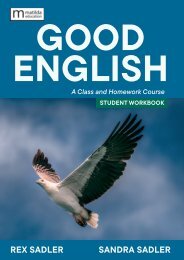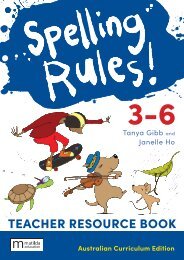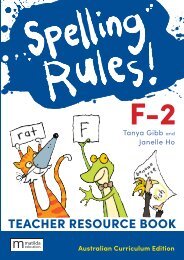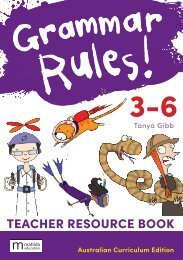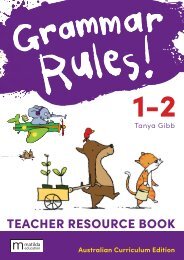Good Science Victorian Curriculum Year 7
Digital sample of Matilda's newest publication, Good Science Victorian Curriculum Year, authored by Emma Craven and Aaron Elias. For more information visit www.matildaeducation.com.au or email Katrina Tucker, katrinatucker@matildaed.com.au
Digital sample of Matilda's newest publication, Good Science Victorian Curriculum Year, authored by Emma Craven and Aaron Elias. For more information visit www.matildaeducation.com.au or email Katrina Tucker, katrinatucker@matildaed.com.au
You also want an ePaper? Increase the reach of your titles
YUMPU automatically turns print PDFs into web optimized ePapers that Google loves.
CHAPTER 3: ECOSYSTEMS<br />
3<br />
Reducing and improving chemical use is important<br />
in agriculture. Organic fertilisers such as compost<br />
and manure add nutrients without causing the<br />
same harm as chemical fertilisers. When chemicals<br />
are used, they must be registered and controlled.<br />
Farmers are required to record their use, including the<br />
date, type of chemical and the amount being used.<br />
What is an example of an organic fertiliser?<br />
Irrigating crops uses large<br />
amounts of water<br />
Figure 3.13<br />
Micro-irrigation<br />
systems are<br />
replacing<br />
traditional<br />
spraying<br />
methods for<br />
some crops.<br />
4<br />
Have you ever seen a jet of water shooting up high to spray downwards<br />
on a crop at a farm? These types of irrigation waste a lot of water –<br />
some of the water evaporates or doesn’t reach the plant, so a large<br />
amount needs to be used to soak into the soil.<br />
Micro-irrigation systems are replacing some traditional irrigation<br />
sprayers. They are water pipes sitting just above the crops, allowing<br />
water to drip slowly on the plants.<br />
Scientists also use scheduling tools to work out the best time to irrigate<br />
a particular crop based on rain forecasts, plant stress and temperature.<br />
This gives better plant growth and prevents water from being wasted<br />
when irrigation isn’t needed.<br />
What is irrigation?<br />
Selective breeding is used to develop<br />
new crops<br />
Some scientists study different species of crop to increase yield and find<br />
varieties that can resist drought, pests and diseases. This can be done<br />
as part of selective breeding programs.<br />
When a disease destroys a crop, a few plants usually survive because<br />
they are naturally resistant. Scientists can then breed more of those<br />
plants to create an entire crop that’s resistant to the disease.<br />
Blackleg is a fungus that damages canola crops in New South Wales<br />
and Victoria. Farmers usually use chemical sprays to kill and prevent<br />
the spread of blackleg, but the chemicals also affect the ecosystems.<br />
Scientists have studied varieties of canola that can resist blackleg.<br />
Growing these varieties of canola is the best way to control the effects<br />
of blackleg in Australia.<br />
What is selective breeding?<br />
CHECKPOINT 3.6<br />
1 Define agriculture in your<br />
own words.<br />
2 Give two examples of crops<br />
grown in Australia.<br />
3 Give one example of how<br />
scientific knowledge has<br />
influenced agriculture.<br />
4 Explain why chemicals are<br />
often used in agriculture.<br />
5 Suggest why some farmers<br />
are starting to use organic<br />
fertilisers.<br />
6 Why do farmers usually grow<br />
monocultures rather than<br />
a variety of crops?<br />
7 Describe why deforestation<br />
is necessary for agriculture.<br />
INQUIRY<br />
8 Undertake some research<br />
to suggest one way farmers<br />
could improve the productivity<br />
of wheat in times of drought.<br />
SUCCESS CRITERIA<br />
I can explain what<br />
agriculture is with at least<br />
two examples.<br />
I can describe how<br />
science and technology<br />
can contribute to finding<br />
solutions to a range of<br />
contemporary issues in<br />
agriculture.<br />
47













